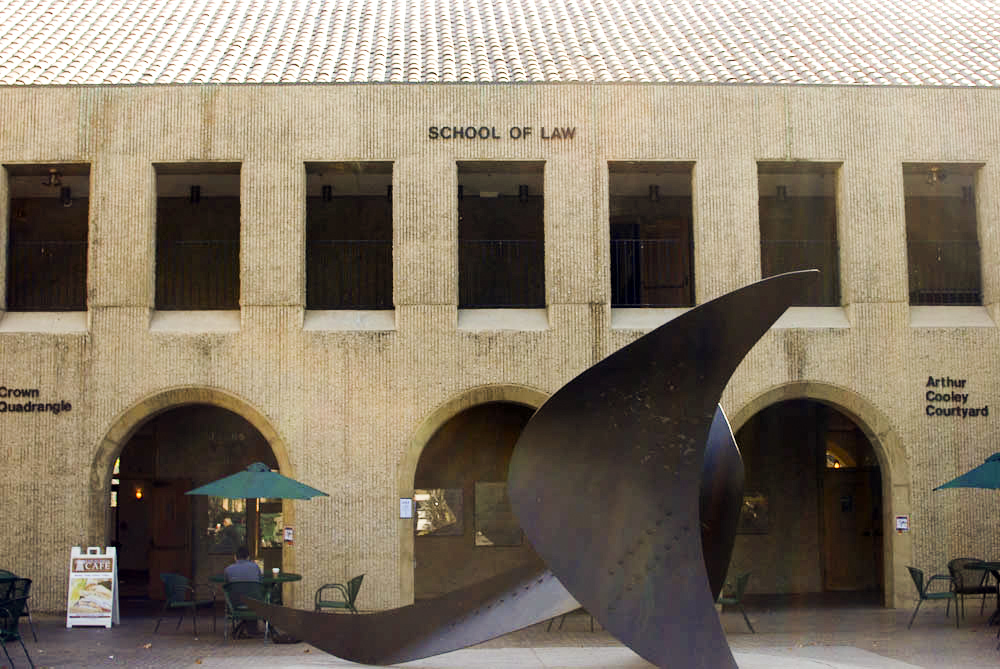Stanford Law School (SLS) announced the launch of the Sally B. and William H. Neukom Center for the Rule of Law in late October, an endeavor funded by donations from SLS alum William Neukom ’67 and his wife Sally Neukom.
The Center will begin academic research and teaching in 2023 about issues related to rule of law, from accessible justice to civic education. Students and faculty in the Center will collaborate with the World Justice Project (WJP), an international non-profit created to advance the rule of law, of which Neukom is the CEO, and the Wright Center for the Study of Computation and Just Communities, a center at Dartmouth University that focuses on the role of computation in government. The Center will also eventually sponsor an annual research consortium, lecture series, graduate research and policy labs, according to SLS spokesperson Stephanie Ashe.
“The Rule of Law Program has had a 23-year history at Stanford and it’s actually, in some ways, poetic because the funding has come full circle,” said law lecturer Erik Jensen, who directs the Rule of Law Program. Jensen called the creation of the Center a “critical expansion” with “more diverse activity” and additional faculty and staff.
Neukom has worked at Stanford as a member of the Dean’s Advisory Council at SLS and served on the board of the Center for Advanced Study in Behavioral Sciences. Before that, he was a lawyer for Microsoft until 2002, after which he served as the CEO of the San Francisco Giants from 2008 to 2011. The William H. Neukom Building, located at 555 Nathan Abbott Way, was dedicated to Neukom in 2011.
“The rule of law is a system of laws, institutions, norms and community support, which delivers accountability, just laws, open government and accessible justice,” William Neukom told The Daily. “We have been working on that definition for 15 years at the [World Justice] Project.”
Neukom has been teaching a seminar on the rule of law at the SLS since 2013 but said, “It is time for there to be a center for scholars to be researching and writing and teaching the rule of law. You can think of it as a new topic that deserves elevation and more prominence on the campus.”
The Center for the Rule of Law will, according to Ashe, “conduct academic research and teaching, experiential learning and collaborations across Stanford and beyond, including with faculty at the law school, faculty affiliated with Stanford Impact Labs, the Hoover Institution, and FSI’s Center for Democracy, Development and the Rule of Law (CDDRL), among others, highlighting the breadth of Stanford’s expertise and bringing it to bear on this critical issue.”
Ashe added that the Center will consist of a combination of current faculty and newly hired faculty whose work relates closely to the rule of law.
Jensen said, “We need so many multiple layered efforts to improve the quality of citizenship and a sense of engagement in our own country, and the Rule of Law Center will be emphasizing that.”
While the Center will be located in the SLS on campus, Neukom encouraged all students to look into its affairs.
“This center will be opening and inviting to students from all over campus. We want undergraduates, we want business school students, we want education graduate students, we want architects to come and understand what the rule of law is and why it’s important,” Neukom said.
Jensen added, “There’s a lot of excitement at the Law School about the Center. We look at this as a terrific opportunity, and it’s not just the Law faculty — a lot of graduate students and undergraduate students will also see opportunities in this.”
The opportunity is especially timely, according to Jensen, who said that there has been a decline in the rule of law internationally, and autocrats around the world are using the judiciary as a tool to manipulate and perpetuate their powers.
In response to the rule of law recession — which Jensen described as the manipulation of judiciary institutions to perpetuate autocrats’ power — Jensen said that it has manifested as political turmoil in the U.S., the Center will likely focus on human rights, civic education in the U.S., governance and institutions.
Though the study of rule of law is not new to Stanford, the Center wants to inspire a new generation of scholars, according to Ashe. It will inspect the core concepts of justice, opportunity and peace to prepare Stanford Law students for their future roles in the spheres of democracy and law.
“There’s more and more challenges to the rule of law and so it is time for more resources and attention to be paid to it because, I believe, it is foundational,” Neukom said. “The best way to persuade more influential people and more voters to support rule of law is to have more people have an understanding of its meaning, how you measure adherence to it and why it matters in such a foundational fashion.”
The Center’s to-be-appointed academic director will be responsible for determining whether the Center will also offer opportunities for undergraduate students. Ashe referenced the Stanford Center for Racial Justice’s work with undergraduate students to describe what future opportunities may look like.
Ashe emphasized the importance of defending the rule of law in the U.S. and worldwide, stating that the new center will prepare students for this goal through its research and general programming.
“Thanks to the Neukoms’ generous support, the Neukom Center will jumpstart research, drive public convenings and strategic collaborations to accelerate the impact of that research,” Ashe said.
